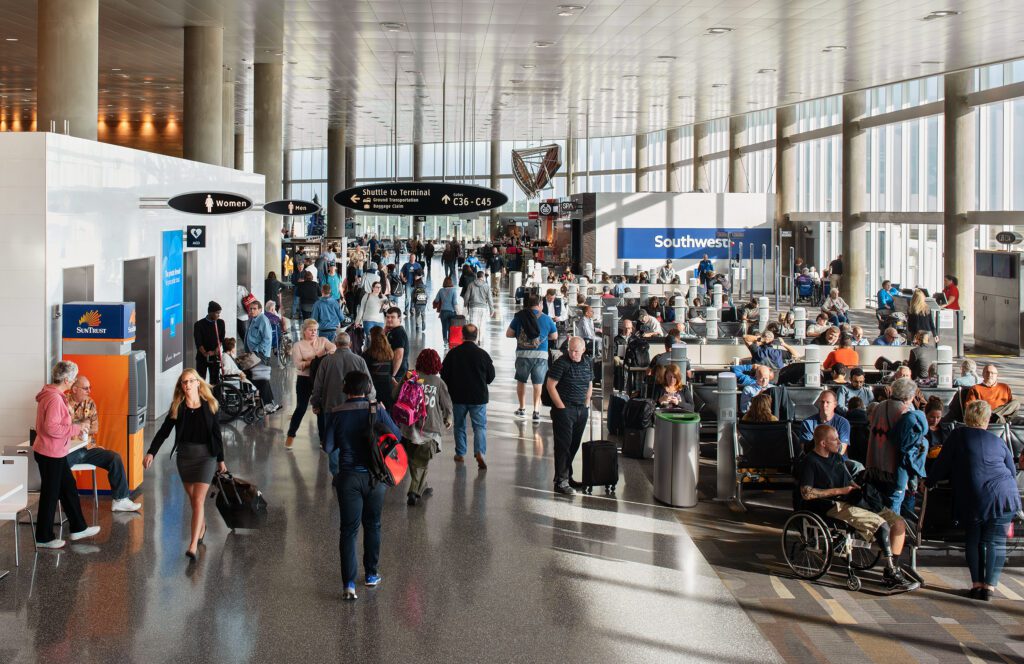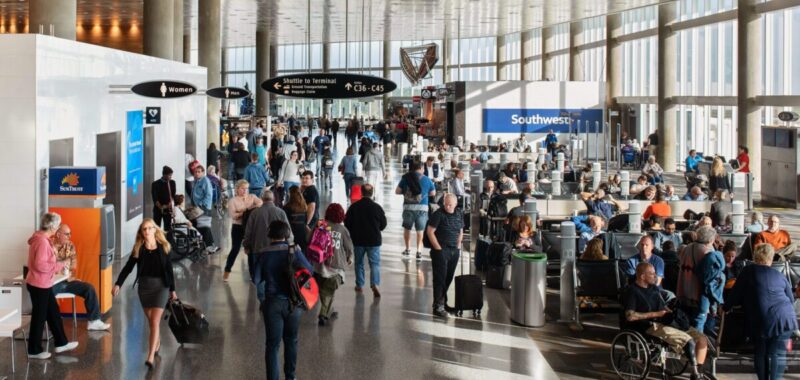
While much of the airline industry hopped on the premium boom in 2024, it was also a big year in Washington.
Clamping down on consumer practices in the airline industry was a cornerstone of the Biden administration — many regulations and crucial court decisions came in 2024. A federal judge struck down the merger between JetBlue and Spirit Airlines. Just months later, Spirit filed for Chapter 11 bankruptcy.
But the Department of Transportation approved the Alaska-Hawaiian merger, contingent on several consumer protections.
Senators held hearings with airline executives, expressing frustration with a lack of transparency on pricing “junk fees.”
Some of these initiatives won the praise of consumers but the consternation of airline executives. When asked about his thoughts on President-elect Donald Trump, Delta Air Lines CEO Ed Bastian said his stance on regulations could be “a breath of fresh air.”
And now as Trump is set to take office once again, it’s unclear how long some of these Biden era regulations will last.
Automatic Refunds and Junk Fees
One of the more controversial regulations put forth by the Biden administration this year was related to junk fees and automatic refunds.
The DOT issued a rule in March that would require airlines to issue automatic refunds in the event a flight is significantly delayed or canceled and if a customer turns down a rebooked flight.
The issue of automatic refunds turned out to be politically popular on both sides of the aisle, as it eventually made its way into the FAA Reauthorization Act. Once the FAA bill passed Congress, automatic refunds became law.
The industry reception to automatic refunds was tepid at best. American Airlines CEO Robert Isom said during a call with analysts in April that the rule had some “gray” areas. Airlines for America, the trade group that represents most major U.S. carriers , criticized the DOT for creating the two rules “without collaboration.”
The rule on disclosing all junk fees upfront was more contentious. Major airlines sued to block the rule and the Fifth Circuit Court of Appeal ultimately ruled in their favor. Senators — both Democrats and Republicans — became frustrated with executives at American, Delta, United, Spirit and Frontier during a hearing on junk fees in December. Senator Josh Hawley, a Republican from Missouri, bluntly told them : “Flying on your airlines is horrible.”
So far, Trump has promised to slash regulations across the board. It’s unclear how or if it could impact airline consumer regulations. During Trump’s first term, he scrapped an Obama-era rule that required airlines to disclose the pricing on baggage fees.
And while Trump distanced himself from Project 2025 during his presidential campaign, the agenda’s chapter on the DOT described consumer protections as a “problematic area.” It advocated for Trump to restore a streamlined approach to consumer regulations from his first term.
But airlines have become a bipartisan issue in Washington, with some of the most progressive Democrats and most right-wing Republicans supporting more consumer regulation on the industry.
Loyalty Programs and Credit Card Points
Also in 2024, the DOT opened an investigation into airline loyalty programs, seeking to determine whether the four largest U.S. airlines have engaged in unfair, deceptive or noncompetitive practices.
The Consumer Financial Protection Bureau also opened an investigation into credit card rewards programs, including the ones of airlines.
Both investigations examined whether the devaluing of points and miles had negatively impacted consumers. During a hearing in May, CFPB director Rohit Chopra said the agency’s investigation had so far found that airlines and credit card companies could “quickly and dramatically” devalue points by making it more difficult to redeem them or limiting what items can be purchased with points.
While the DOT has not yet released the findings of its investigation, the CFPB released a circular on December 18 that found that devaluing points on credit card rewards programs could count as an unfair or deceptive practice.
Given how lucrative co-branded credit cards have been for airlines, the report could have a ripple effect on the industry. Circulars are typically issued to various enforcement agencies and state attorneys general, who could now target airline rewards programs and credit card issuers.
Jaret Seiberg, a Washington analyst at TD Cowen, wrote in a note to investors that the report could survive the Trump administration given that the findings are not politically controversial. He also noted that the report could force airlines to further devalue their loyalty programs to avoid any further government action.
More Mergers?
While the Biden administration adopted a more hawkish attitude on mergers, a Trump administration could be more relaxed.
The DOJ under Biden successfully sued to block the JetBlue-Spirit merger, but airline executives have generally anticipated to see more merger activity under Trump.
Some analysts have speculated that Spirit could merge with another airline if it exits bankruptcy. David Neeleman, the founder of JetBlue, Azul and Breeze, told Skift he felt fairly certain that a Spirit-Frontier merger could happen in 2025.
At the Skift Aviation Forum in November, both American and JetBlue hinted at the possibility of reviving the Northeast Alliance, which was struck down under the Biden administration.
“I think there could be a structure that could work,” said JetBlue president Marty St. George.
Project 2025’s chapter on the DOT stated that a new administration would be more supportive of “joint-venture efforts by smaller carriers,” citing JetBlue-Spirit as an example.
The Rise of Elon Musk
Elon Musk, who will co-chair Trump’s Department of Government Efficiency and has been described as the “first buddy,” could have a significant amount of power in the upcoming administration.
He’s already flexing his political muscles. After telling representatives in Congress not to vote for a spending bill on X, the government was almost headed for a shutdown before Christmas.
But he could also have a significant impact on the Federal Aviation Administration and the DOT. Through DOGE, he could advocate for slashing consumer protections or loosening FAA regulations on space launches, which has also received some support from Republican senators.
Musk has a complicated relationship with the FAA. The agency has fined SpaceX for violating the terms of its launch licenses and Musk has gone as far as to call for FAA chief Mike Whitaker to resign. Now, Whitaker, who was unanimously confirmed by the Senate last year, is set to step down from the agency’s top post on Trump’s Inauguration Day.
The vacancy could give Trump the opportunity to nominate someone who’d be willing to loosen certain regulations, specifically those related to space.

